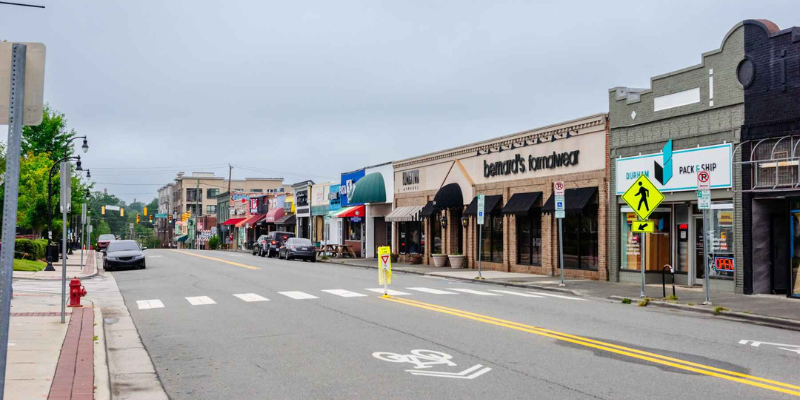
Durham, NC, has a perfect mix of urban excitement and southern charm, which makes this city one of the most dynamic in the state. Potential residents and investors must understand the cost of living here. This guide analyzes the various living expenses—housing, utilities, groceries, and entertainment—and compares these expenses to other areas in a meaningful way. This guide will help anyone looking to relocate to understand the economic reality of Durham and the most important value for relocating. Whether you’re moving or investing, Cardinal Home Buyers can help you make smart real estate decisions in Durham.
Understanding the Cost of Living in Durham
In order to determine the cost of living in Durham, NC, a thorough examination of multiple aspects dealing with everyday expenses is necessary. Located in the center of the state, Durham is a part of a thriving and growing community that offers reasonable wages and is easy to access. For newcomers, understanding the cost of living relative to the national average is imperative in making informed decisions. Housing, transportation, utilities, food, healthcare, and other services and amenities are all part of the total cost of living. While an individual’s lifestyle plays a role in everyday expenses, most residents of Durham spend less than the national average on total living expenses.
In terms of the total cost of living in Durham, the price of housing is a more than significant component. New residents may rent or buy a home based on their economic and personal preferences to achieve their housing and lifestyle goals. This is also a factor in the living wages that enable residents to achieve a reasonable standard of living without working excessively. Besides housing, the other major components to consider are the cost of transportation and the price of healthcare. Relatively inexpensive methods of commuting are provided by the public transportation systems, and major highways also ease the commute to work and other destinations. This makes commuting more affordable compared to cities that have a higher cost of living.
Living in Durham, NC, is assessed by analyzing various expenses and comparing them to the average in the country. Such information is useful for prospective residents assessing affordability and the standard of living. For those exploring nearby areas, tools like a Closing Costs Calculator in Raleigh, NC can also provide valuable insights into real estate expenses and overall cost comparisons. Durham is continuously growing and improving, and to ensure that residents stay aware, citizens must understand the full picture. It is important to have this knowledge for anyone contemplating joining this lively community in North Carolina.
Housing Costs: Buying vs. Renting in the City
For many people living in Durham, NC, the question of whether to buy or rent a home is a weighty one. The housing market in the area is diverse, and each of the diverse options comes with unique implications. For homebuyers, the opportunity to purchase a home in Durham is appealing because it affords a long-term investment opportunity, particularly in comparison to the home prices of many other fast-growing cities. For those people who want to be able to move to a different area or neighborhood and would like to explore multiple areas before deciding on a final one, renting is particularly appealing. Given the rapid growth of the city, it is vital to understand the workings of the housing market and the costs of available options.
| Neighborhood | Average Rent (1-Bedroom) | Characteristics | Potential Demographic |
|---|---|---|---|
| Downtown Durham | $1,600 – $1,900 | Historic homes, tree-lined streets,and close to Duke University | Young professionals, students |
| Trinity Park | $1,400 – $1,700 | Modern amenities, shopping centers, and a convenient suburban setting | University faculty, families |
| Southpoint | $1,200 – $1,500 | Historic homes, tree-lined streets, and close to Duke University | Young families, professionals |
| East Durham | $1,000 – $1,300 | Emerging neighborhood, affordable housing options | Artists, students, budget-conscious renters |
This table underscores the diverse housing opportunities available in Durham, illustrating how rent prices and neighborhood characteristics influence living choices within the city.
Comparing Rent Prices Across Neighborhoods

When determining where to live in Durham, consideration must be given to comparing rental charges across several communities to maximize the value of your resources. The city has several different communities. Each has its own distinct characteristics and varying living costs and economic structures. The high energy and crammed atmosphere define the city’s downtown area, which has various attractions like restaurants and shops, and recreation activities; however, the economic costs to live here are also very high. The direct city area is also very heavily inhabited, so the costs of renting a one-bedroom apartment are generally between $1,200 and $1,800, which varies mainly according to the apartment’s proximity to valuable features and the additional furnishing it provides.
Suburban regions such as Southpoint tend to be less expensive than the city, although they still provide city services. In this region, the average cost of a one-bedroom unit is approximately $1,100 to $1,500. This region features a more family-friendly environment, which is appealing to professionals as well. East Durham has more affordable housing, which provides more family-friendly housing alternatives. In this region, one-bedroom units cost approximately $800, which provides more affordable housing for students and young professionals. It is also important to note that the overall housing cost is more than the rent price. The overall housing cost, proximity to the university, commercial centers, and places of employment also add to the overall rent cost. It is also essential to consider the different lifestyles and communities each neighborhood provides. Visiting open houses and speaking with people in the area can give a lot of information. Whether you prefer the bustling city or the more peaceful suburbs, Durham has the neighborhood that is right for you.
Utility Expenses: Monthly Costs Explained
For a complete overview of the cost of living, one must analyze the average utilities that Durham, NC, provides. While the price of housing may take a large share of the budget, monthly utility expenditures must also be considered. On average, utilities comprise electricity, water, heating, cooling, garbage, the Internet, and other routine household services. Insight into the average monthly cost of these utilities aids in preparing an efficient cost of living. This also assists residents in planning and controlling their living costs more effectively.
Utilities in Durham are typically regarded as affordable in comparison with the national average. Monthly electricity expenses typically vary between 100−100−150, depending on the season and household size. Monthly water expenses are much lower than the national average and fall between 30−30−50, which increases value perception. This is also lower than the expected average, which makes Durham even more attractive to potential immigrants. Internet service adds 60−60−100, depending on the service provider and plan selected. Residents also have the option of improving utility expenses, which can minimize overall expenses. For example, the gradual replacement of appliances with energy-efficient appliances, or simply monitoring a home’s heating and cooling systems, will produce a benefit. Residents have access to community-sponsored energy audits and efficiency rebate programs, which assist in cost-effective management of utility expenses. An evaluation of average monthly expenses, when combined with housing and transportation, provides a complete picture of life in the city. This picture can help residents make spending choices within their means, which, in turn, deliver on their desired lifestyle.
Food and Grocery Prices in Durham

Analyzing the cost of living in Durham, NC, is about the cost of the basic staple goods, primarily food and groceries, and their contribution to household expenditure. The purchasing of groceries can be done from diverse shopping setups in Durham, from small local markets and local Durham supermarket chains to large multinational supermarket chains. This competition is positive because it is cost-effective for a Durham resident. Affordability of groceries is a positive aspect of the cost of living in Durham because, relative to grocery prices in other major North Carolina cities, prices in Durham are lower. Moreover, the prices charged for fresh fruits and vegetables are low compared to other major cities, which is positive for the budgets of families interested in nutritional diets. For households, local growers’ markets are cost-effective and contribute positively to the local economy. For other grocery staples, maintaining low prices in Durham, like moderately priced dairy, bread, and cereals, contributes positively to the choice availability for households.
Durham offers its residents a wider range of food options at many price levels during any given month. This offers numerous restaurants across many different price points, from lower to higher priced restaurants. This allows residents to stretch a month’s budget further. Restaurant meals tend to emphasize different cultural meals, which increases the range of culinary delights available. The attractiveness of Durham as a place to live increases as a wider range of meals becomes available, increasing its potential as a culinary destination. The attractiveness of Durham to live in increases as meals become available in a variety of options. Also, when evaluating interactions in Durham, grocery costs in Durham are lower than in Raleigh. This allows residents to stretch their monthly budgets. Understanding the various costs of food, alongside the prices of groceries, allows residents to maintain a balanced standard of living.
Healthcare Costs: What to Expect
At first, navigating healthcare costs in Durham, NC, can seem overwhelming, but knowing the average healthcare cost can help residents plan their costs better. Average healthcare costs in the city are influenced by several factors, particularly the existence of world-class medical facilities and research centers. On average, Durham’s health costs are lower because medical facilities of varying costs and higher quality are able to provide and balance the cost of care. Durham healthcare costs and affordability quality are among the lowest in the nation. Basic healthcare services, including doctor visits, general check-ups, and specialist consultations, are provided, and costs are lowered compared to services offered in cities that have similar healthcare facilities, helping residents with access to a variety of healthcare plans and to a more competitive health insurance coverage.
Understanding healthcare expenses is important for potential residents of Durham. Although average costs vary based on personal circumstances and insurance plans, most residents conclude that Durham healthcare costs warrant the value of the presumed costs. Many hospitals and clinics continue to offer payment plans for patients whose situations would otherwise result in expensive and problematic healthcare costs. Those considering moving to Durham can fairly and reasonably assess local healthcare services and costs when compared with other communities. Those considering the move from Raleigh to Durham should compare local Raleigh and Durham healthcare services and costs, especially the most expensive chronic illness services. Medical services in Durham are more comprehensive and cost-effective across the spectrum of medically necessary healthcare services in Durham and are more reasonably priced, which is important for potential residents of adjacent communities. Educating yourself on healthcare costs in Durham opens the gateway to concerns around service costs that are expected to be paid for healthcare services, which is a nice way to communicate assuredly for your personal primary healthcare services.
Transportation Options and Their Costs in the City
Durham, NC, offers different modes of transport, which directly affect your average transport spending. Each transport type in the city, be it public transport, driving a car, or riding a bike, has different spending implications. The average transport price in Durham is influenced greatly by these choices, which is why they shouldn’t be overlooked in your overall monthly budget. Analyzing these transport expenditures gives a clearer idea of the housing budget. Analyzing transport expenditures in Raleigh in comparison to those in Durham helps you understand if the distance and transport in Durham fit your personal and budgetary requirements.
Understanding transportation costs is fundamental to calculating one’s total cost of living in Durham. Each transportation option, along with its associated average costs, has the potential to greatly impact one’s budget on a monthly basis. A budgeter within the city can assess the cost of public transport, determine costs associated with a personal vehicle, or even evaluate the expense of biking. A comparison of transport options available in Durham with those available in Raleigh highlights significant differences in cost. For those focused on transportation savings, the cost differences in Durham will suit their needs quite well. New citizens of Durham will be pleased by the low-priced transport options available and will have their experience in Durham improved even further by the city’s efficient transport options. Fun Facts About Durham include its award-winning public bus system and extensive network of greenways, which make commuting both affordable and enjoyable. As a result of well-priced transport options, citizens can make more cost-effective overall decisions while living in Durham. Transport options available will result in improved overall quality of life for its citizens.
Comparing Transportation Costs with Raleigh

Examining transportation expenses in Durham and nearby Raleigh offers residents an understanding of their travel choices and their costs. The two cities, which make up part of the Research Triangle, have enough in common to warrant a comparison, but differences in average transportation costs justify looking closer at their geography, infrastructure, and population density. In the case of Durham, the cost of public transport is… affordable. GoDurham, the bus transit system that serves the city, charges about 1forasinglerideand1forasinglerideand38 for a monthly pass. These prices make public transportation the least expensive travel option available, especially for those looking to keep their monthly expenses to a minimum.
In contrast, GoRaleigh may charge marginally higher prices compared to GoDurham, but the difference isn’t significant. Beyond the usual operating costs of a personal vehicle – gas, insurance, maintenance, and parking – costs in Durham are lower, and personal vehicles in transit are less congested on the roads. Lower levels of road congestion translate to less fuel burned during a trip. For car owners in Durham, gas prices and insurance are lower than in Raleigh, providing an additional edge for owners who are cost-conscious. Riding a bike is also a popular and less expensive option for getting around in both locations, where there are ample bike lanes and community-sponsored programs around sustainable travel. In the case of Durham, there are more than enough bike travel opportunities to reach different neighborhoods. People looking to relocate should take into consideration how transportation costs for a specific location relate to their overall budget. They may prefer the more relaxed transport situation of Durham, which is also inexpensive, or the more hectic transport situation of Raleigh, which is more expensive.
When choosing between Durham and Raleigh for transportation, consider the following factors:
- Analyze the frequency and reach of the public transit systems before commuting decisions.
- Consider the impact of fuel expenses due to different traffic conditions in both cities.
- Evaluate the monthly costs of public transport passes and any potential savings.
- Explore biking infrastructure and potential savings on travel expenses.
- Compare insurance rates to understand the financial advantages of car ownership in each city.
- Assess the availability of parking facilities and their associated costs.
- Factor in the effect of local community travel initiatives on your budgetary planning.
- Think about personal lifestyle preferences and how they align with each city’s transportation environment.
A comprehensive decision takes into account both short-term and long-term transport costs for each city.
Durham, NC, brings together affordability and a lively atmosphere. Though housing is the greatest cost, the mild prices of groceries, healthcare, and public transport ease the burden a bit. I hope this guide helps you evaluate the financial side of a potential relocation or helps you gain a better idea of the financial situation in the area. By adjusting your lifestyle and meeting the expenses, you are positioned to take advantage of all this active city offers. From the downtown area with a historical touch to the growing arts and culture, Durham offers affordable living—and if you’re planning to sell, there are dependable cash home buyers in Durham or in nearby cities ready to help make your move smooth and quick.
FAQs
What contributes to the cost of living in Durham, NC?
Durham, NC, is evaluated on affordability based on price points in housing, utilities, food, health care, and transportation. The constellation of these components may fluctuate, thus determining the baseline affordability of a region in the country.
How does Durham’s housing market impact living costs?
Durham’s cost of living is greatly influenced by housing. Compared to other growing cities, housing costs are relatively cheaper, whether one decides to buy or rent. Nonetheless, variations in rent by neighborhood provide different financial implications for the community.
Are utilities in Durham, NC, affordable?
Yes, utilities in Durham are considered reasonably priced. Costs for utilities, diffused among a monthly budget, are understandable for residents. Electricity, water, and Internet bills are manageable and typically costs are below the national average.
How does Durham compare to Raleigh in terms of transportation costs?
Most public transport options in Durham tend to be cheaper, and for that matter, bus services also charge lower rates. Fuel and insurance costs tend to be lower as well, and hence, considering the overall cost of living, Durham makes for an affordable residential choice.
What should potential residents know about healthcare costs in Durham?
Thanks to its advanced healthcare facilities, Durham offers cost-effective, competitive healthcare services. For those living here, the costs of basic healthcare services and associated insurance packages are much lower relative to city care of comparable quality.
Durham, North Carolina, offers a balanced cost of living that combines affordability with a great quality of life. Housing prices are reasonable compared to nearby cities like Raleigh and Chapel Hill, while utilities and groceries remain close to the national average. The city’s strong job market and access to top education and healthcare make it a smart choice for both families and professionals. Dining, entertainment, and cultural activities are plentiful without breaking the budget, making Durham an appealing place to live and invest. For homeowners considering selling, there’s a company that buys homes in Wake Forest or in nearby cities that can make the process fast, fair, and hassle-free.
Do you need to sell your home? Sell quickly, avoid costly repairs, or prefer a hassle-free sale. Cardinal Home Buyers is here to help. We offer fair cash offers, handle all the details, and make the process seamless. Ready to sell or have questions? Contact us at (919) 609-5173 for a no-obligation offer. Get started today!
Helpful Durham Blog Articles
- The Best and Worst Neighborhoods in Durham, NC
- Fun Facts About Durham, NC
- Cost of Living in Durham, NC
- Durham, NC Closing Costs Calculator
- Is Durham, NC a Good Place to Live?
- Durham, NC Neighborhood Map
- Durham, NC Property Managers
- Free Things To Do in Durham, NC
- Best Things To Do in Durham, NC With Kids

